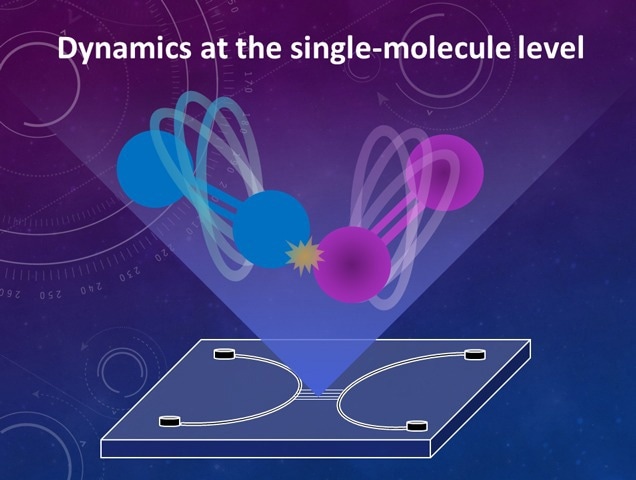As molecules from various substances interact to generate new molecules, the bonds between their atoms are altered. This is known as a chemical reaction. In an incredibly brief period of time, the molecules collide at a distance of one nanometer or less. This makes it challenging to investigate the specifics of molecular-scale chemical reactions.
 Dynamics at the single-molecule level. The moment two single molecules trapped in the nanofluidic device collide allowing them to react with each other. Image Credit: Osaka Metropolitan University
Dynamics at the single-molecule level. The moment two single molecules trapped in the nanofluidic device collide allowing them to react with each other. Image Credit: Osaka Metropolitan University
The majority of experimental knowledge utilized to understand the dynamics of single-molecule reactions was discovered by observing gaseous processes. However, since the vast majority of chemical reactions occur in liquids, understanding single-molecule reaction dynamics in solution is a difficult task with few experimental resources.
Individual molecules can be contained in a test tube-like environment using a nanofluidic device, which is a few square centimeters of a glass plate with nanofluidic channels carved into it.
However, nanofluidic devices have the potential to be combined with a variety of currently available analytical tools with a high temporal resolution to study incredibly quick single-molecule reactions.
The study’s authors, Dr. Nattapong Chantipmanee and Associate Professor Yan Xu of the Graduate School of Engineering at Osaka Metropolitan University, have generated engineering principles and technologies that allow free manipulation of nanomaterials, biomaterials, and molecules down to the single molecule level.
The approaches addressed by their study make use of fundamental technologies, including fluidic control and measurement, functional integration, and nanofluidic processing, paving the way for the interdisciplinary application of nanofluidics.
They are also striving to find solutions to issues like how to accurately control small molecules in solution and how to detect their incredibly quick—nano-to picosecond—reactions to illuminate the single molecule dynamics of reactions in solution using their own nanofluidic devices.
In the January 2023 issue of TrAC Trends in Analytical Chemistry, the researchers published their review article on single-molecule reaction dynamics in solution, which were pioneered by nanofluidic devices.
Being pioneers in this new sector, the study offers a bird’s eye view, highlighting the forefront of research and development, impending difficulties, and potential future possibilities.
Nanofluidic devices have the potential to become a fantastic experimental tool to elucidate the dynamics of solution reactions. I hope this paper will encourage more researchers to join this budding field of research.
Yan Xu, Study Author and Associate Professor, Graduate School of Engineering, Osaka Metropolitan University
The study was partially supported by JSPS KAKENHI (Grant Nos. JP21H04640, JP18H01848, JP26630403, JP19KK0129, and JP20H00497), MEXT KAKENHI (Grant Nos. JP21H05231, JP19H04678, and JP26107714), JST PRESTO (Grant No. JPMJPR18H5), and JST CREST (Grant No. JPMJCR18H2).
The Development and Promotion of Science and TechnologyTalents Project of Thailand (Grant No. DPST532133) are also acknowledged by the authors.
Journal Reference:
Chantipmanee, N., et al. (2023) Nanofluidics for chemical and biological dynamics in solution at the single molecular level. TrAC Trends in Analytical Chemistry. doi:10.1016/j.trac.2022.116877.